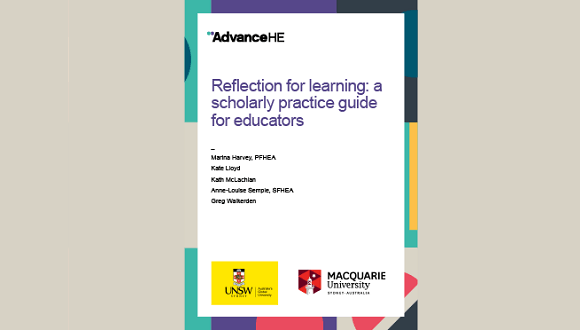Reflection today
The world of higher education is full of reflection. Search the globe and you will find thousands of university subjects that include an expectation that their students will reflect on, and for, their learning. The majority of students reflect through journaling, or writing up a diary. There are many good reasons for this: writing is a familiar and comfortable practice. It is also a cheap option needing only a pen and paper or access to a keyboard and device. And reflection supports academic learning, skills development and lifelong learning!
A call for changing practice
As our student numbers grow and our cohorts become more diverse, we need to respond by providing diverse options for practising reflection. We need to ‘move beyond the diary’ and offer many modes for reflective practice. As we acknowledge that reflective practice is a somatic, whole-of-body practice, and that emotions are evoked at all levels of reflection (Harvey, Baumann & Fredericks, 2019) it becomes even more imperative to expand from our dependency on cognitive text-based practices to explore and practice other modes of reflective practices.
Scholarly support
Those who teach and support student learning are often assumed to know about reflective practice, but not everyone is confident in their knowledge, skills and practice. Professionally, academics who seek professional recognition are expected to develop and share reflective accounts of practice (as for Advance HE’s Fellowship scheme). We need to scaffold and support these teachers and professional colleagues, as well our students, in reflective practice (Coulson & Harvey, 2013). Educators need just in time support in the form of a diverse range of reflective practice activities that can be practised in the classroom (or online). With many time pressures on curriculum, educators also need access to short, engaging options for reflection that can be undertaken in five minutes.

A new practice guide
The new Reflection for learning: a scholarly guide for educators has been developed by a team, or a learning circle, of Australian academics over eight years of Action Research, experimentation, workshopping, teaching and reflection.
The practice guide has been developed to address the need for both traditional text and cognitive-based activities and especially offers a range of creative activities. Workshop and classroom participants regularly rate the creative approaches as the best option for their learning and professional needs (Harvey & Vlachopoulos, 2018). Each activity is underpinned by a succinct reference to the research evidence of how it supports learning. Short and simple instructions on how to facilitate the activity, what materials are needed and how much time to allow are provided as well as links to videos and an accompanying workshop resource.
A call to experiment
Reflective practices have the potential for transformative learning and can be used in any learning environment. Download the practice guide and experiment with a new practice you have not used before. Reflect on how it works in your professional context. Reflect on how students engage with the activity, even ask your students for their feedback.
Which is your favourite reflective practice activity?
Marina Harvey is a Principal Fellow and an Australian National Teaching Fellow and has received national and university citations for outstanding contributions to student learning. For over a decade she has taught, researched, experimented with and practiced reflection for learning. Her Action Research has produced over 80 scholarly publications.
Download Reflection for learning: a scholarly guide for educators
References
Coulson, D. & Harvey, M. (2013). Scaffolding student reflection for experience-based learning: a framework. Teaching in Higher Education, 18 (4), 401-413. doi:10.1080/13562517.2012.752726
Harvey, M., Baumann, C. & Fredericks, V. (2019). A taxonomy of emotion and cognition for student reflection: introducing emo-cog. Higher Education Research & Development, 38(6), 1138-1153.
Harvey, M. & Vlachopoulos, P. (2018 online). What a difference a day makes: Reflection retreats as academic development in higher education. Journal of Further and Higher Education.
Harvey, M., Coulson, D. & McMaugh, A. (2016). Towards a theory of the ecology of reflection: reflective practice for experiential learning in higher education. Journal of University Teaching and Learning Practice, 13(2).
Harvey, M; Coulson, D; Mackaway, T. and Winchester-Seeto, T. (2010). Aligning reflection in the cooperative education curriculum. Australia Pacific Journal of Co-operative education, 11 (3), 137-152.
Harvey, M; Baker, M; Bosanquet, A; Coulson, D; Semple , A. & Warren, V. (2012). Moving beyond the diary: innovation in design and delivery of reflection. Paper presented at the 2012 ACEN Collaborative education: Investing in the future conference, 31 October-2 November, Geelong.